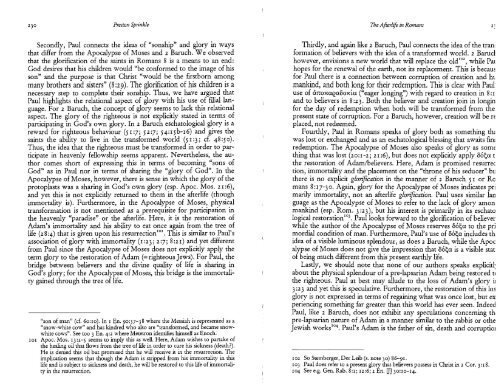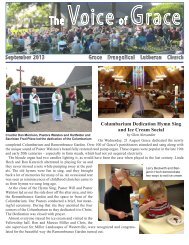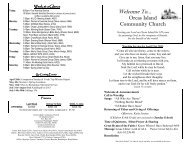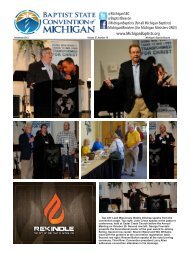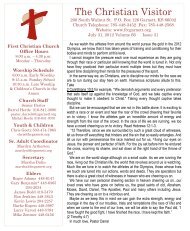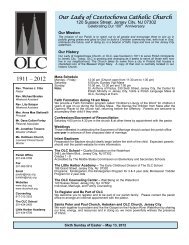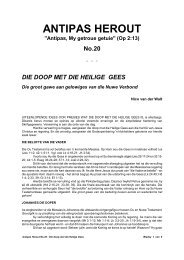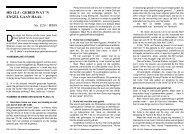Law and Life: Leviticus 18.5 in the Literary Framework of ... - Clover
Law and Life: Leviticus 18.5 in the Literary Framework of ... - Clover
Law and Life: Leviticus 18.5 in the Literary Framework of ... - Clover
Create successful ePaper yourself
Turn your PDF publications into a flip-book with our unique Google optimized e-Paper software.
230 Preston Spr<strong>in</strong>kle Be Afterlife <strong>in</strong> Romans 21<br />
Secondly, Paul connects <strong>the</strong> ideas <strong>of</strong> "sonship" <strong>and</strong> glory <strong>in</strong> ways<br />
that differ from <strong>the</strong> Apocalypse <strong>of</strong> Moses <strong>and</strong> 2 Baruch. We observed<br />
that <strong>the</strong> glorification <strong>of</strong> <strong>the</strong> sa<strong>in</strong>ts <strong>in</strong> Romans 8 is a means to an end:<br />
God desires that his children would "be conformed to <strong>the</strong> image <strong>of</strong> his<br />
son" <strong>and</strong> <strong>the</strong> purpose is that Christ "would be <strong>the</strong> firstborn among<br />
many bro<strong>the</strong>rs <strong>and</strong> sisters" (8:29). The glorification <strong>of</strong> his children is a<br />
necessary step to complete <strong>the</strong>ir sonship. Thus, we have argued that<br />
Paul highlights <strong>the</strong> relational aspect <strong>of</strong> glory with his use <strong>of</strong> filial language.<br />
For 2 Baruch, <strong>the</strong> concept <strong>of</strong> glory seems to lack this relational<br />
aspect. The glory <strong>of</strong> <strong>the</strong> righteous is not explicitly stated <strong>in</strong> terms <strong>of</strong><br />
participat<strong>in</strong>g <strong>in</strong> God's own glory. In 2 Baruch eschatological glory is a<br />
reward for righteous behaviour (5 I :7; 5 2:7; 5 4:15 b-16) <strong>and</strong> gives <strong>the</strong><br />
I<br />
sa<strong>in</strong>ts <strong>the</strong> ability to live <strong>in</strong> <strong>the</strong> transformed world (51:j; cf. 48:50).<br />
Thus, <strong>the</strong> idea that <strong>the</strong> righteous must be transformed <strong>in</strong> order to participate<br />
<strong>in</strong> heavenly fellowship seems apparent. Never<strong>the</strong>less, <strong>the</strong> author<br />
comes short <strong>of</strong> express<strong>in</strong>g this <strong>in</strong> terms <strong>of</strong> becom<strong>in</strong>g "sons <strong>of</strong><br />
1<br />
God" as <strong>in</strong> Paul nor <strong>in</strong> terms <strong>of</strong> shar<strong>in</strong>g <strong>the</strong> "glory <strong>of</strong> God". In <strong>the</strong><br />
Apocalypse <strong>of</strong> Moses, however, <strong>the</strong>re is sense <strong>in</strong> which <strong>the</strong> glory <strong>of</strong> <strong>the</strong><br />
protoplasts was a shar<strong>in</strong>g <strong>in</strong> God's own glory (esp. Apoc. Mos. 21:6),<br />
<strong>and</strong> yet this is not explicitly returned to <strong>the</strong>m <strong>in</strong> <strong>the</strong> afterlife (though<br />
immortality is). Fur<strong>the</strong>rmore, <strong>in</strong> <strong>the</strong> Apocalypse <strong>of</strong> Moses, physical<br />
transformation is not mentioned as a prerequisite for participation <strong>in</strong><br />
<strong>the</strong> heavenly "paradise" or <strong>the</strong> afterlde. Here, it is <strong>the</strong> restoration <strong>of</strong><br />
Adam's immortality <strong>and</strong> his ability to eat once aga<strong>in</strong> from <strong>the</strong> tree <strong>of</strong><br />
life (28:4) that is given upon his resurrectionror. This is similar to Paul's<br />
association <strong>of</strong> glory with immortality (I:23; 2 :7; 8 :21) <strong>and</strong> yet different<br />
from Paul s<strong>in</strong>ce <strong>the</strong> Apocalypse <strong>of</strong> Moses does not explicitly apply <strong>the</strong><br />
term glory to <strong>the</strong> restoration <strong>of</strong> Adam (=righteous Jews). For Paul, <strong>the</strong><br />
bridge between believers <strong>and</strong> <strong>the</strong> div<strong>in</strong>e quality <strong>of</strong> life is shar<strong>in</strong>g <strong>in</strong><br />
God's glory; for <strong>the</strong> Apocalypse <strong>of</strong> Moses, this bridge is <strong>the</strong> immortali-<br />
ty ga<strong>in</strong>ed through <strong>the</strong> tree <strong>of</strong> life.<br />
IOI<br />
"son <strong>of</strong> man" (cf. 60:1o). In I En. go:j7-38 where <strong>the</strong> Messiah is represented as a<br />
"snow-white cow" <strong>and</strong> has lundred who also are "transformed, <strong>and</strong> became snowwhite<br />
cows". See too 3 En. 4:r where Metetron identifies hunself as Enoch.<br />
Apoc. Mos. 13:r-5 seems to imply this as well. Here, Adam wishes to partake <strong>of</strong><br />
<strong>the</strong> heahg oil that flows from <strong>the</strong> tree <strong>of</strong> life <strong>in</strong> order to cure his sickness (death?).<br />
He is denied this oil but promised that he will receive it <strong>in</strong> <strong>the</strong> resurrection. The<br />
implication seems that though <strong>the</strong> Adam is stripped from his immortality <strong>in</strong> this<br />
Lfe <strong>and</strong> is subject to sickness <strong>and</strong> death, he will be restored to this life <strong>of</strong> immortality<br />
<strong>in</strong> <strong>the</strong> resurrection.<br />
I<br />
I<br />
I<br />
Thirdly, <strong>and</strong> aga<strong>in</strong> hke 2 Baruch, Paul connects <strong>the</strong> idea <strong>of</strong> <strong>the</strong> tran:<br />
formation <strong>of</strong> believers with <strong>the</strong> idea <strong>of</strong> a transformed world. 2 Barucl<br />
however, envisions a new world that will replace <strong>the</strong> oldr0', while Pa1<br />
hopes for <strong>the</strong> renewal <strong>of</strong> <strong>the</strong> earth, not its replacement. This is becaw<br />
for Paul <strong>the</strong>re is a connection between corruption <strong>of</strong> creation <strong>and</strong> h~<br />
mank<strong>in</strong>d, <strong>and</strong> both long for <strong>the</strong>ir redemption. This is clear with Paul<br />
use <strong>of</strong> ttrcoxaea6oxia ("eager long<strong>in</strong>g") with regard to creation <strong>in</strong> 8:1<br />
<strong>and</strong> to believers <strong>in</strong> 8:23. Both <strong>the</strong> believer <strong>and</strong> creation jo<strong>in</strong> <strong>in</strong> long<strong>in</strong><br />
for <strong>the</strong> day <strong>of</strong> redemption when both will be transformed from <strong>the</strong><br />
present state <strong>of</strong> corruption. For 2 Baruch, however, creation will be rc<br />
placed, not redeemed.<br />
Fourthly, Paul <strong>in</strong> Romans speaks <strong>of</strong> glory both as someth<strong>in</strong>g th;<br />
was lost or exchanged <strong>and</strong> as an eschatological bless<strong>in</strong>g that awaits f<strong>in</strong>;<br />
redemption. The Apocalypse <strong>of</strong> Moses also speaks <strong>of</strong> glory as some<br />
th<strong>in</strong>g that was lost (~o:I-2; 21:6), but does not explicitly apply 665a t<br />
<strong>the</strong> restoration <strong>of</strong> Adam/believers. Here, Adam is promised resurrec<br />
tion, immortality <strong>and</strong> <strong>the</strong> placement on <strong>the</strong> "throne <strong>of</strong> his seducer" bu<br />
<strong>the</strong>re is no explicit glorification <strong>in</strong> <strong>the</strong> manner <strong>of</strong> 2 Baruch 5 I or Ro<br />
mans 8 :17-3 o. Aga<strong>in</strong>, glory for <strong>the</strong> Apocalypse <strong>of</strong> Moses <strong>in</strong>dicates pri<br />
marily immortality, not an afterlife glorifcation. Paul uses similar lan<br />
page as <strong>the</strong> Apocalypse <strong>of</strong> Moses to refer to <strong>the</strong> lack <strong>of</strong> glory amon<br />
mank<strong>in</strong>d (esp. Rom. 3 :23), but his <strong>in</strong>terest is primarily <strong>in</strong> its eschato<br />
logical restorationro3. Paul looks forward to <strong>the</strong> glorification <strong>of</strong> believer<br />
while <strong>the</strong> author <strong>of</strong> <strong>the</strong> Apocalypse <strong>of</strong> Moses reserves 665a to <strong>the</strong> pri<br />
mordial condition <strong>of</strong> man. Fur<strong>the</strong>rmore, Paul's use <strong>of</strong> 6650: <strong>in</strong>cludes th<br />
idea <strong>of</strong> a visible lum<strong>in</strong>ous splendour, as does 2 Baruch, while <strong>the</strong> Apoc<br />
alypse <strong>of</strong> Moses does not give <strong>the</strong> impression that 665a is a visible stat<br />
<strong>of</strong> be<strong>in</strong>g much different from this present earthly life.<br />
Lastly, we should note that none <strong>of</strong> our authors speaks explicitl;<br />
about <strong>the</strong> physical splendour <strong>of</strong> a pre-lapsarian Adam be<strong>in</strong>g restored tc<br />
<strong>the</strong> righteous. Paul at best may allude to <strong>the</strong> loss <strong>of</strong> Adam's glory i<br />
3 :23 <strong>and</strong> yet this is speculative. Fur<strong>the</strong>rmore, <strong>the</strong> restoration <strong>of</strong> this 10s<br />
glory is not expressed <strong>in</strong> terms <strong>of</strong> rega<strong>in</strong><strong>in</strong>g what was once lost, but ex<br />
perienc<strong>in</strong>g someth<strong>in</strong>g far greater than this world has ever seen. Indeed<br />
Paul, like 2 Baruch, does not exhibit any speculations concern<strong>in</strong>g th<br />
pre-lapsarian nature <strong>of</strong> Adam <strong>in</strong> a manner similar to <strong>the</strong> rabbis or o<strong>the</strong><br />
Jewish worksro4. Paul's Adam is <strong>the</strong> fa<strong>the</strong>r <strong>of</strong> s<strong>in</strong>, death <strong>and</strong> corruptioi<br />
102 SO Stemberger, Der Leib (s. note 30) 86-91.<br />
103 Paul does refer to a present glory that believers possess <strong>in</strong> Christ <strong>in</strong> 1 Cor. 3 :I 8.<br />
104 See e.g. Gen. Rab. 8:1; 12:6; r En. [J] jo:10-14.


